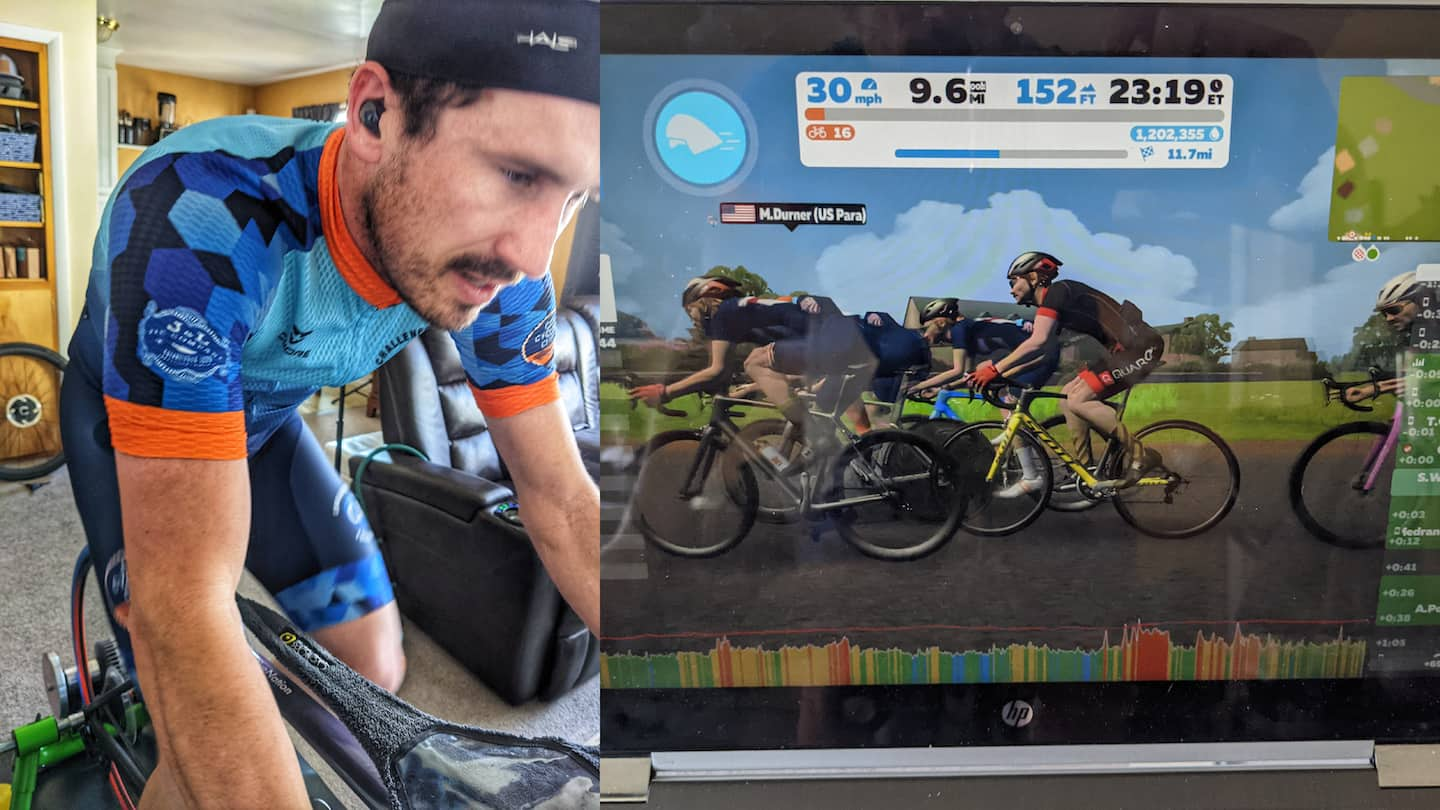
Steven Wilke Is Driven To Succeed So He Can Help Others Do The Same
by Joanne C. Gerstner

Steven Wilke trains via the Zwift app, which has allowed him to train virtually during the COVID-19 pandemic. (Photos courtesy of Steven Wilke)
Steven Wilke wants to accomplish something big, like change-the-world style. His goal is to become an elite Para-cyclist, be part of Team USA and compete in the Paralympic Games.
But that’s only half of the dream.
This is not about fulfilling his ego. It’s actually the opposite, as Wilke wants to help others do something profound: accept and love themselves.
Wilke was born with Poland Syndrome, a disorder that made his left arm, hand and fingers shorter and lacking inmuscular strength compared with his right side. His disability affected his mindset, as he struggled since childhood to accept his body.
He said he is in a good place now, thanks to a powerful experience volunteering as a mountain bike instructor over the past two years with the National Ability Center in Park City, Utah.
“That is the one thing I want to do, if I can make it to Tokyo, I want to have the experience to help others with disabilities learn that they can do anything,” Wilke said, referencing the Paralympic Games Tokyo 2021. “Growing up, I felt I couldn’t do anything. I had bad anxiety. I tried to hide my disability and my arm because I was embarrassed for being the way I am. I don’t feel that way anymore. Volunteering changed me. Being around so many who were disabled, like me, but had a different outlook, changed my life.
“I have come to see that it is OK if I am different, or if you are different. Accepting myself and realizing I can do anything has made me stronger. I want to give that to others, by sharing my story and showing what I can do on the highest level.”
Wilke is at the start of his elite competitive journey, as he just completed the U.S. Paralympics Cycling talent identification camp in December. He has been riding all his life, mostly in mountain biking. He took up road cycling over the past few years and discovered he was a strong rider there too.
He works as a digital content coordinator for Scott Sports, a global bike and sporting goods manufacturer in Salt Lake City. Which is a good thing, as going out for rides during his lunch or before work are encouraged from the top.
Wilke knows he rides fast, based on his times, but doesn’t know much about race strategy and best training practices. He also needs to get a proper road racing/time trial bike, tailored to his body and riding style.
That’s where hopefully joining Team USA comes in. Wilke has been trying to get his disability classification but has been stalled due to COVID-19 cancelling the sessions. The 2020 slate of races were wiped out by the pandemic, leaving him with training on his own. So, he made a point of following U.S. Paralympics Cycling’s social media for news and emailing the organization a few times to highlight his interest.
“I really wanted to get into this, so I was really happy when they responded to me — it was so exciting,” Wilke, 37, said about being invited to the talent camp.
He thinks his strength lies in time trialing, as he enjoys long, hard rides and cranking high wattage. He hasn’t ridden on a track yet, mostly because of the lack of a velodrome near him, but would be open to trying that too.
Wilke said the opportunity to regularly train over Zwift with coaches like U.S. Paralympics Cycling’s Jim Lehman and other elite cyclists is going to make him better. He has also applied for a grant from the Challenged Athlete Foundation to get funding for a personal coach.
“All I do is ride hard right now, so I know I need to do more and learn more to get to that next level,” he said. “I need to learn how to race, to manage things like getting fatigued out from going too hard.”
Wilke was optimistic, based on his times, that he was on track to contend for Team USA until the early fall. He suffered a bad cycling crash while training in August, injuring his back and putting him on a slow comeback with physical therapy.
He wants to enter into U.S. Paralympics Cycling’s series in Huntsville, Alabama, in April, but that is still in doubt. His recovery comes first, and Wilke said the primary goal is to be at his best for the Paralympic trials in June.
“I crashed pretty hard, so I know getting back to where I was is hard,” he said. “I feel with my abilities I could still make it to Tokyo, but it is hard to say where I will be with my recovery. I am really going to try for it. That’s the goal.
“But if it doesn’t happen, I have three years until the next Paralympics. I feel I am good enough to make it. I am really driven right now.”